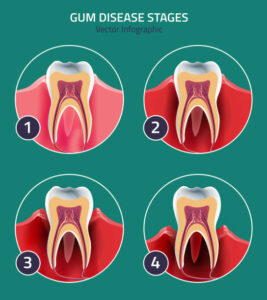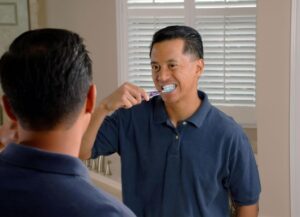

 Gum hygiene is just as important as tooth hygiene for proper oral care. Gum disease is the number one reason for tooth loss and is entirely preventable. If you do develop gum disease, treatments will depend on the severity. If the disease is caught early, professional cleaning may be sufficient.
Gum hygiene is just as important as tooth hygiene for proper oral care. Gum disease is the number one reason for tooth loss and is entirely preventable. If you do develop gum disease, treatments will depend on the severity. If the disease is caught early, professional cleaning may be sufficient.
Our hygienists at Wilson House Dental Practice will give you tips on how to improve your oral hygiene. It’s important to brush your teeth twice a day gently to remove plaque trapped in the tiny gaps between your teeth. Flossing at least once a day is another great way to maintain good gum health. Scheduling professional cleanings with our dental hygienist will also help keep your gums healthy and your teeth sparkling.
Come and take a look at our treatments, if you are looking to improve your smile, click HERE for an appointment or by calling 01908 611478.
 Wilson House Dental Practice specialise in dental care and can help you maintain gum health. We recommend a healthy diet and the right oral care products to use for your needs, including toothpaste and mouthwash.
Wilson House Dental Practice specialise in dental care and can help you maintain gum health. We recommend a healthy diet and the right oral care products to use for your needs, including toothpaste and mouthwash.
Maintaining good oral hygiene is important for reducing bad breath, plaque buildup, cavities and gingivitis. Brush your teeth twice a day with fluoride toothpaste, as it will not only clean your teeth but also strengthen them against decay. It is recommended to brush on the inside of your mouth, which removes bacteria and food particles that build up there. If you struggle to reach this area, try using an interdental cleaner. Floss or use another type of threader every day so that food particles don’t get stuck between your teeth or below the gum line where they could cause irritation. Change your toothbrush every 3 months, or sooner if you notice fraying bristles or an unpleasant taste when brushing.
 Gum disease is an issue because it causes tooth decay and it can lead to other diseases such as heart disease, diabetes, high blood pressure, and stroke. People with gum disease are more likely to develop cavities and bone loss due to persistent infections. There are many habits that contribute to gum disease including poor oral hygiene or the use of tobacco products like cigarettes. Approximately 90% of adults in the UK have gum disease, even if only a small amount. Fortunately, gum disease can be prevented if you maintain a good oral hygiene routine, including regular brushing, dental checkups, and visits to a hygienist.
Gum disease is an issue because it causes tooth decay and it can lead to other diseases such as heart disease, diabetes, high blood pressure, and stroke. People with gum disease are more likely to develop cavities and bone loss due to persistent infections. There are many habits that contribute to gum disease including poor oral hygiene or the use of tobacco products like cigarettes. Approximately 90% of adults in the UK have gum disease, even if only a small amount. Fortunately, gum disease can be prevented if you maintain a good oral hygiene routine, including regular brushing, dental checkups, and visits to a hygienist.
 If you are experiencing any of these symptoms, we encourage you to come to see one of our dentists. Gum disease can cause serious health problems if left untreated.
If you are experiencing any of these symptoms, we encourage you to come to see one of our dentists. Gum disease can cause serious health problems if left untreated.
Here are a couple of signs that you have gum disease:
Plaque consists mostly of bacteria. If left untreated, plaque can eventually lead to periodontitis as follows:
 You should brush your teeth at least twice a day; early in the morning and before bed is a good idea. The perfect toothbrush is lightweight, has rounded bristles and has been out in the open air for no more than three months. The head should be the right size to access the insides of your mouth, and the bristles should be soft enough to prevent harming the gum tissue. reviews have noted that the most effective toothbrushes are the ones with rotating or oscillating heads.
You should brush your teeth at least twice a day; early in the morning and before bed is a good idea. The perfect toothbrush is lightweight, has rounded bristles and has been out in the open air for no more than three months. The head should be the right size to access the insides of your mouth, and the bristles should be soft enough to prevent harming the gum tissue. reviews have noted that the most effective toothbrushes are the ones with rotating or oscillating heads.
Flossing is a means of removing plaque that accumulates between the teeth. This combined with the fact that it helps reduce periodontal disease and provides more space in the pockets of the gums, makes it an important tool. It’s hard to clean teeth between the teeth with a toothbrush. You should clean this area with dental floss on a daily basis. What flavour or type of floss you use doesn’t really matter. Select dental floss that will be effortless and pleasant to employ.
Contact us today and we can book you in for a scale and polish appointment or other treatments.
Come and take a look at our treatments, if you are looking to improve your smile, click here for an appointment or by calling 01908 611478
Back to Hygiene/Therapists
All adult patients can opt to join Denplan Essentials from their very first visit. Those wanting more inclusive cover can choose Denplan Care instead. Following an assessment, your dentist will advise which group you will be able to join.
Read MoreMonday
8am – 6pm
Tuesday
8am – 6pm
Wednesday
8am – 6pm
Thursday
8am – 6pm
Friday
8am – 6pm
Saturday
Closed
Sunday
Closed